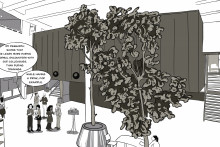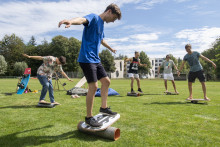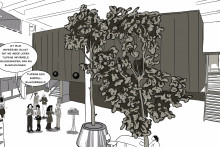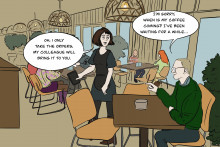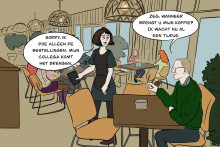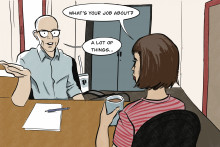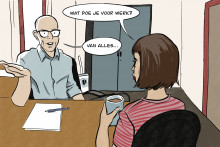'For many people, learning is a dirty word', says educational researcher Maaike Endedijk. 'Particularly in the healthcare sector, people have to take many compulsory training courses to prove that they are still qualified and aware of new regulations. That's not necessarily wrong, but learning can also very well be done in other ways.'
Endedijk researches how people can be supported and stimulated to continue learning during their working life. That doesn't always have to be done through further training - in fact, such training only proves to be effective to a very limited extent. 'I am mainly concerned with informal learning, learning that takes place at the coffee machine.'
According to the researcher, people working in healthcare and education gain almost half of their learning experiences through social interaction: by looking closely at the behaviour of colleagues and having a chat with them. Another 45% of new knowledge and skills are gained by experimenting or searching the internet themselves. Official work training courses only account for a few percent of all learning experiences related to work.
Endedijk looks at how she can give ‘pinpricks’ to motivate people to share knowledge, ask questions and give feedback. For example, by letting people use an app with which they can get tips from colleagues. Or by having them wear a button as a sign that they are open to feedback from colleagues. Stories about her work usually garner positive reactions over a pint, she says. 'The misunderstanding is often that as an educational researcher I do research into education and training. But if I explain exactly what I am doing, everyone can imagine it.'

However, the link between science and daily practice is not immediately visible to many lay people, the researcher notes. For example, those who enjoy a great deal of autonomy at work will often find it easier to develop themselves. The fact that some employees prefer a little more structure does not detract from this general principle. Nevertheless, in the eyes of many lay people, such exceptions detract from general scientific knowledge. 'Institutions sometimes put scientific insights aside somewhat easily because, in their eyes, it does not fit within the organisation. For example, they say: I need research in my organisation, because then I know how it works here. Yet we see that many mechanisms are fairly universal. So we have to help make that translation into practice.'
Also among students, she sometimes senses the idea that science and practice are two different things. They say: 'I want to do an internship at companies, then I'll see how it really works. But you can also take part in a research project in which we do research at twenty companies, so you get a much broader picture. There is often a feeling that science is something that is done in a small room by an older man wearing a checkered jacket. But science is really getting your feet muddy.'



